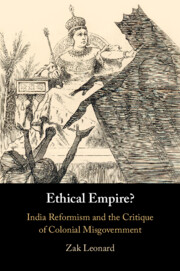Book contents
- Ethical Empire?
- Ethical Empire?
- Copyright page
- Contents
- Figures and Table
- Preface and Acknowledgments
- Association Abbreviations and Key Membership
- Introduction
- 1 The Origins of Reform
- 2 “A Blot on English Justice”
- 3 Public Works, Publicity, and the Search for a New State-Idea
- 4 Reformist Collaboration and the Formation of an Imperial Civil Society
- 5 Anomalous Annexations
- 6 Politicizing Decline
- 7 Radical Reformism and the Challenge of Capitalist Complacency
- Epilogue: Integrating the Empire
- Bibliography
- Index
5 - Anomalous Annexations
Debating the Law of Nations and Princely Sovereignty
Published online by Cambridge University Press: 05 October 2023
- Ethical Empire?
- Ethical Empire?
- Copyright page
- Contents
- Figures and Table
- Preface and Acknowledgments
- Association Abbreviations and Key Membership
- Introduction
- 1 The Origins of Reform
- 2 “A Blot on English Justice”
- 3 Public Works, Publicity, and the Search for a New State-Idea
- 4 Reformist Collaboration and the Formation of an Imperial Civil Society
- 5 Anomalous Annexations
- 6 Politicizing Decline
- 7 Radical Reformism and the Challenge of Capitalist Complacency
- Epilogue: Integrating the Empire
- Bibliography
- Index
Summary
Chapter 5 investigates the Indian government’s anomalous accession to “paramountcy,” which led it to pursue the territorial annexation of princely states. Controversially, this process often necessitated the violation of Britain’s celebrated “rule of law” and brought the nation’s reputation for fair play into question. Seeking to check this expansionism, reformers amalgamated classical law of nations theories with the findings of contemporary international law treatises to defend the rights of native rulers in Awadh, Tanjore, the Carnatic, and Mysore. If India’s princely states were protected, reformers anticipated that their sovereigns would internalize constitutionalist values and provide employment for educated Indians who struggled to find positions in the exclusive colonial bureaucracy.
- Type
- Chapter
- Information
- Ethical Empire?India Reformism and the Critique of Colonial Misgovernment, pp. 155 - 188Publisher: Cambridge University PressPrint publication year: 2023

